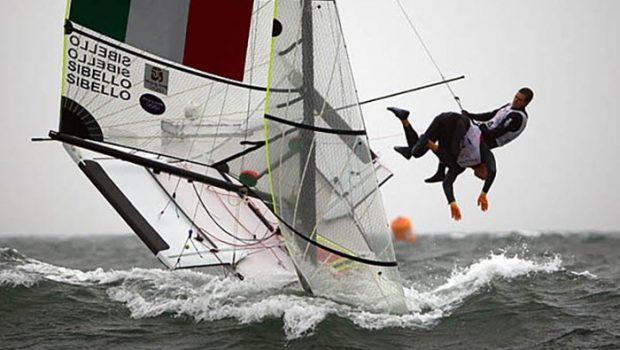We watch for the mistakes
Published on November 9th, 2019
by Craig Leweck, Scuttlebutt
Will Jackson works for Blueclaw Media, a UK company born from the digital age that tracks how we think and feel, and he sent us some new research that calculates the most exciting sports, stating that mistakes are what makes individual sports so thrilling.
It reminded me of a meme I posted during the SailGP season of the United States SailGP Team in which they were teetering on the edge, flying too high, and seemed destined for a hard landing. The meme said, “Admit it, you want this to end badly.” It was not my most sensitive moment, confirmed by the mothers of the sailors that were angry at me.
However, it was my belief that with the F50 going at high speeds, you weren’t getting thrilled by tacking duels and spinnaker sets. There were none. And as speed becomes somewhat relative, the difference between 20 and 30 knots is hard to tell. I found the thrill to be the foiling, which tends to mean we are waiting for the crash.
As entities within the sport seek to heighten its commercial appeal, and with spectating as a metric to move the needle, determining why people watch sailing (rather than do sailing) is what dictates the format for sailing events.
I anticipate the second season of SailGP will have closer racing and less crashes which will be a better test of its future. Here’s Will’s information:
‘Mistakes are what makes sport exciting’, says data expert
While we all love 90th-minute winners or an incredible return to win a game of tennis, the moments that truly make sport exciting are mistakes, one expert has suggested.
Rob Mastrodomenico, owner of Global Sports Statistics, believes that slow-building tension that leads up to a mistake and victory for the opposition is often more exciting than a game that is filled with points.
His comments follow the release of the Sports Excitement Scorecard by Football Predictions, which has analysed decades of sporting data and concluded that boxing is the most exciting sport of all.
However, it’s not just the number of knockdowns, uppercuts or jabs which makes a fight exciting.
Anthony Joshua’s routine wins against the likes of Joseph Parker and Alexander Povetkin just didn’t get the pulse racing, but one of the most shocking and exciting moments in the ring of 2019 was when he was stopped by the unknown Andy Ruiz Jr, and in the process losing his world title belts while Tyson Fury’s improbable draw against Deontay Wilder was also made more exciting by the narrative.
These moments, according to Mastrodomenico, that are a true indicator of excitement in sport. “When you’re talking about the data, is it the sheer volume of what’s happening or is it the quality of what’s happening?” he said.
“Like in a game of snooker you get lots of moments per second, but a lot of the time the excitement has to build until someone makes a mistake.
“Risk vs reward is a major factor, in terms of what a point is worth in each sport and the excitement associated with it. For example, you don’t see many goals in football but maybe that’s what makes it way more exciting.”
Sometimes, the lower the quality of the sporting contest, the greater the excitement of the event.
That was particularly the case with the 2019 Cricket World Cup final between England and New Zealand, when there were just 482 runs scored across the two innings but the low-scoring nature of the contest meant the game was always in the balance and set up a thrilling finale – which many have described as the best game in the history of the sport.
By contrast, the infamous Wimbledon clash between John Isner and Nicolas Mahut was the longest tennis match in history with an incredible 980 points over 11 hours of battle. But did the vast amount of action really make it an exciting spectacle?
In the Champions League last season, Manchester City beat Tottenham 4-3 in the second leg at the Etihad but in a game that saw seven goals – including five in the first 21 minutes – the most exciting part of the game came in one moment, when Raheem Sterling was denied a dramatic late goal to deny City progression by video technology, leaving the whole stadium and millions of viewers in suspense and sparking a wide range of emotions in the subsequent celebrations.
It’s these individual moments that truly define excitement in sport, rather than extensive use of data.
It’s a late winner in a football match, a super over in a Cricket World Cup final or a shock knockdown in a boxing clash that give us our most memorable sporting moments rather than a cumulation of points throughout.
For further insight into Sports Excitement Scorecard, click here, where you will find each sport ranked in terms of their value and return on investment to fans.
Does this mean we’d prefer to watch a tacking duel among 12 Meters, waiting for the blown tack, than high speed races that ping off the sides of the course? Here’s esteemed commentator Peter Montgomery sharing his favorite moment from the many America’s Cup campaigns he has witnessed since 1980…










 We’ll keep your information safe.
We’ll keep your information safe.